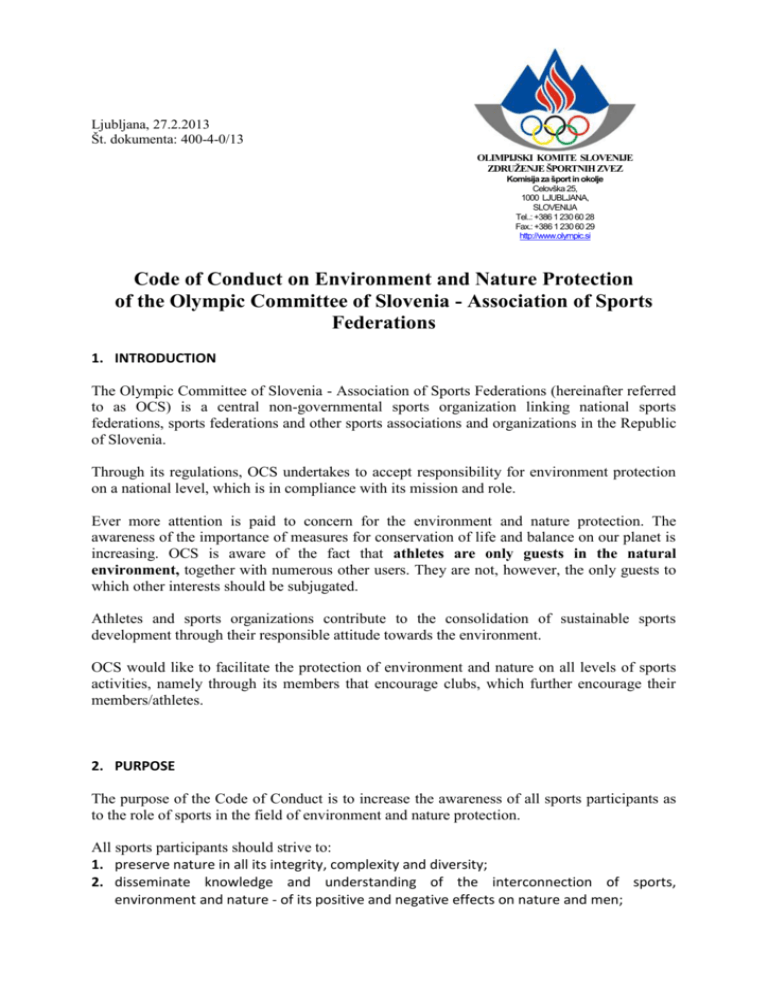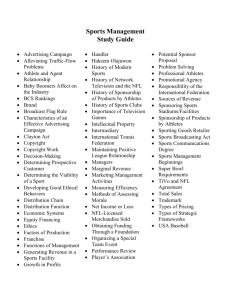Code of Conduct on Environment and Nature Protection of the
advertisement

Ljubljana, 27.2.2013 Št. dokumenta: 400-4-0/13 OLIMPIJSKI KOMITE SLOVENIJE ZDRUŽENJE ŠPORTNIH ZVEZ Komisija za šport in okolje Celovška 25, 1000 LJUBLJANA, SLOVENIJA Tel..: +386 1 230 60 28 Fax.: +386 1 230 60 29 http://www.olympic.si Code of Conduct on Environment and Nature Protection of the Olympic Committee of Slovenia - Association of Sports Federations 1. INTRODUCTION The Olympic Committee of Slovenia - Association of Sports Federations (hereinafter referred to as OCS) is a central non-governmental sports organization linking national sports federations, sports federations and other sports associations and organizations in the Republic of Slovenia. Through its regulations, OCS undertakes to accept responsibility for environment protection on a national level, which is in compliance with its mission and role. Ever more attention is paid to concern for the environment and nature protection. The awareness of the importance of measures for conservation of life and balance on our planet is increasing. OCS is aware of the fact that athletes are only guests in the natural environment, together with numerous other users. They are not, however, the only guests to which other interests should be subjugated. Athletes and sports organizations contribute to the consolidation of sustainable sports development through their responsible attitude towards the environment. OCS would like to facilitate the protection of environment and nature on all levels of sports activities, namely through its members that encourage clubs, which further encourage their members/athletes. 2. PURPOSE The purpose of the Code of Conduct is to increase the awareness of all sports participants as to the role of sports in the field of environment and nature protection. All sports participants should strive to: 1. preserve nature in all its integrity, complexity and diversity; 2. disseminate knowledge and understanding of the interconnection of sports, environment and nature - of its positive and negative effects on nature and men; 3. use environment-friendly, nature-friendly and energy-saving materials, aids and facilities; 4. reduce the consumption of water and its pollution, to facilitate efficient water consumption and to reduce all kinds of harmful effects on environment and nature; 5. facilitate the use of renewable resources. 3. PARTICIPANTS In compliance with our efforts to implement the Code of Conduct, the Code of Conduct should be available to all individuals on all levels of sports activities. It should also target individual participants. Therefore, the Code of Conduct is published on the OCS websites and accessible to everyone. It deals with requirements and opportunities in the field of nature and environment protection for the following participants: OCS National sports federations Local (municipal or intermunicipal) sports federations Professional sports associations and other associations Sports associations and clubs Athletes/members 3.1. OLYMPIC COMMITTEE OF SLOVENIA - ASSOCIATION OF SPORTS FEDERATIONS OCS shall strive to: adjust its Code of Conduct on Environment and Nature Protection to new findings in the field of environment protection and nature conservation, and to user experience; constantly encourage national sports federations to adjust and update their internal acts regarding the ethical attitude towards the environment and nature during the performance of sports activities, and to act responsibly in terms of environmental protection, and to set an example by providing financial support or support in the form of free-of-charge training courses; establish a licensing system that would issue licences »ENVIRONMENT- AND NATUREFRIENDLY national sports federation«, which would stimulate national sports federations to act responsibly in terms of environmental protection; appoint a member of the Executive Board that would be responsible for environmental policy and nature protection, and that would also act as the Chairman of the OCS Sport and Environment Commission; provide financial and human resources for professional management of the field of nature and environment; in cooperation with national sports federations, represent the interests of the sports in the field of nature and environment; participate in the preparation of legislation, declarations and recommendations in the field of nature, environment and land development planning, and ensure that sport is considered therein; facilitate research of the connection between sports, nature, environment and land development planning; increase the understanding of the effects of sports activities on nature and environment, which could be achieved on the basis of analyses and development of the profession, and issue recommendations as to how sports can be friendly to nature and environment; provide counsel and disseminate knowledge as to how athletes and sports organizations could show respect for nature and environment; encourage sports organizations to organize such sporting events that would stimulate visitors to act responsibly in terms of environment and nature protection; encourage sports organizations to organize such sporting events that would stimulate visitors to act responsibly in terms of environment and nature protection; Moreover, sporting events should be organized in a manner that does not require any additional changes in the landscape and that has no harmful effects on nature (e.g. new roads and new car parks that would only be used at the time of the event). If this is not possible, organizations should make sure that these changes are minimum and that land is properly rehabilitated after the event; encourage sports organizations to carefully plan the construction of new sports facilities; make use of the existing facilities and consider the possibility of their renovation; try to preserve nature when building new facilities and properly integrate them in the environment; encourage sports organizations to organize sports competitions in areas with existing infrastructure that do not require any changes in nature and landscape; hold conferences for sports organizations to familiarize them with the connection between sports, nature, environment and land development planning; facilitate and draw attention to best practices in sports organizations as regards the protection of nature, environment and interventions in the landscape; encourage its members to constantly educate/train volunteers and employees in associations and clubs as regards the issue of nature and environment protection, and planned interventions in the landscape; increase the recognition of initiatives coming from the world of sports and relating to nature, environment and planned interventions in the landscape; facilitate research of the importance of recreation in nature for public health and the importance of raising awareness about the effects of recreation in nature on physical and mental health. It shall also strive to draw up an annual report on the implementation of the Code of Conduct and present the report to the Assembly. 3.2. NATIONAL SPORTS FEDERATIONS National sports federations act in accordance with principles, on the basis of which: they obtain knowledge and experience as to the effects of their sport on the environment and nature, and as to the possibilities of performing their sport without any harmful effects on nature and environment. They also learn about the importance of the natural environment for the quality of their sports activities (better understanding of rules and regulations, governing the activities of federations in the field of nature and environment); they encourage their associations/clubs to act responsibly in terms of environment and nature protection; they encourage the organization of such sporting events that would stimulate visitors to act responsibly in terms of environment and nature protection; Moreover, they encourage the organization of sporting events that do not require any additional changes in the landscape and that have no harmful effects on nature (e.g. new roads and new car parks that would only be used at the time of the event). If this is not possible, organizations should make sure that these changes are minimum and that land is properly rehabilitated after the event; they encourage associations/clubs to carefully plan the construction of new sports facilities, to make use of the existing facilities and consider the possibility of their renovation, to try to preserve nature when building new facilities and properly integrate them in the environment; they adhere to the rule that sporting events do not require any additional interventions in the landscape and that nature remains intact (e.g. new roads and new car parks that would only be used at the time of the event). If this is not possible, organizations should make sure that these interventions are minimum and that land is properly rehabilitated after the event; they adhere to the rule that sports competitions are organized in areas with existing infrastructure that do not require any changes in nature and landscape; they obtain new knowledge of the materials they use, and strive to use recycled or degradable materials that have a reduced impact on the environment; their administration strives to use recycled and degradable materials that have minimal impact on the environment; they issue invitations to tenders for materials produced in an environment-friendly manner, and use these materials as much as possible; they avoid pollution with materials and waste by proper waste management; they promote energy efficiency and use of renewable energy sources in their activities. National sports federation that pays special attention to the environment and nature, and that respects general principles should also strive for: implementation of the Code of Conduct principles by emphasizing in its supreme legal document (rules, the statute) the importance of environment and nature protection; preparation of its own code of conduct on environment and nature protection, adjusted to individual sports. The code of conduct can be a separate act or a part of the general code of conduct of the national sports federation; dissemination of knowledge of responsible and respectful attitude of athletes and sports organizations towards nature and environment; provision of counsel to clubs and local sports organizations regarding the issues related to nature, environment and planned interventions in the landscape; development of recommendations for athletes regarding their responsible attitude towards the environment; appointment of a federation representative in the field of nature and environment protection, and interventions in the landscape. The representative should be appointed by the highest body of the organization, which clubs/associations and other organizations can turn to in case of issues related to nature, environment and planning; encouragement of sports teams, organizers and others who work with sports materials to consider the possibilities of material recycling and decomposition and thus reducing the impact on the environment; use of recycled and degradable materials that have minimal impact on the environment; the issue of invitations to tenders for materials produced in an environment-friendly manner, and use of these materials to the widest extent possible; avoidance of pollution with materials and waste by reducing waste and by proper waste management; implementation of measures for reduced energy and water consumption; encouragement of its members to use bicycles or public means of transport during their practice, competitions, seminars, conferences, annual gatherings, meetings, etc. Whenever possible, the federation should provide financial support for such activities; planning of practice and competitions in such a manner so as to reduce the transport of athletes and visitors (and to take into consideration the sports activity); use of those facilities for meetings and practice that have obtained an environment protection certificate; encouragement of its members to seek and use the latest methods for reduction of noise, water, air and light pollution; its athletes/members to consider what measures they could take to reduce the use of personal vehicles when performing their sports activities and especially during mass sporting events (incentives to use public transport, incentives for car sharing, cheaper car park for vehicles with more than two passengers, etc.), to use nature-friendly accommodation, to turn to supply chains that stimulate environment-friendly production, to respect natural heritage, to properly manage chemicals, etc.; noise, light, air and water pollution reduction by using the latest methods in their activities; promotion of education and training of club volunteers in the field of nature, environment and spatial planning; facilitation of research of the connection between sports, nature, environment and spatial planning, and provision of help in these areas; dissemination and collection of knowledge of documented connection between sports, nature, environment and spatial planning; preparation of an annual report on the implementation of the Code of Conduct and its presentation to the highest body of the federation (e.g. Assembly). 3.3. LOCAL SPORTS FEDERATIONS AND PROFESSIONAL SPORTS ASSOCIATIONS Local (municipal or intermunicipal) sports federations, professional sports associations or other associations can act responsibly towards the environment and nature by: appointing persons responsible for environment and nature protection and for planning interventions in the landscape, who will establish dialogue with the local community and professional organizations from this field; integrating the connection between sports, nature, environment and planned interventions in the landscape into municipality programmes; expressing opinion regarding the discussed o municipal spatial plans, o current municipal projects through which interventions in the landscape would be made, or which could have a significant impact on nature or environment; preparing plans for the management of nature protected areas and by participating in discussions with municipality regarding the issues of nature, environment and planning; organizing public debate with the purpose of reaching a wider consensus in cases related to the suitability of areas for sports activities, and/or the regulation of the issue; enabling clubs to perform their activities and providing counsel to them (e.g. consultation with competent national sports federation); providing counsel to clubs in adaptation of their activities to professional guidelines in the field of environment protection and nature conservation, and by acquiring suitable professional guidelines to do so; informing the public of the sports activity with suitable means of communication and with as little intervention in the landscape as possible, and by raising the awareness of the public about the method of the implementation of the activity, which is in compliance with sustainable development principles. 3.4. CLUBS AND ASSOCIATIONS Clubs/ associations should act responsibly in terms of environmental protection by: appointing persons responsible for nature and environment protection and for planning interventions in the landscape (if this is in compliance with the work programme, one person can be be responsible for only one or two of the mentioned areas); establishing dialogue with the local community and national sports federation as regards the nature, environment and planned interventions in the landscape; establishing dialogue with the local authorities and professional organizations from this field; making recommendations to its athletes/members; drawing up an inventory of the areas they use for their activities, and evaluating their vulnerability in terms of environmental protection and nature conservation during the performance of their sports activities; putting forward proposals for improvements in the implementation of the sports activity, whereby potential negative effects on the environment and nature would be reduced, and by devising a strategy of implementing these improvements; taking into consideration the instructions of national sports federations as to how they can show respect to nature and environment with the help of sports; studying the existing legislation, regulations and recommendations of the environmental and nature experts, and of managers of protected areas regarding permits for performing their activities in nature, and by fostering dialogue with local communities about the conditions, governing club activities; adhering to the rule that sporting events do not require any additional changes in the landscape and that nature remains intact (e.g. new roads and new car parks that would only be used at the time of the event). If this is not possible, organizations should make sure that these changes are minimum and that land is properly rehabilitated after the event; encouraging sports organizations to organize sports competitions in areas with existing infrastructure that do not require any changes in nature and landscape; 3.5. ATHLETES/MEMBERS Individual athletes/members should act responsibly in terms of environmental protection by: taking into consideration recommendations of the club and national sports federation regarding the protection of nature, environment and spatial planning; following initiatives in the field of nature, environment and planning in the local environment, and communicating these initiatives to their clubs which then take necessary actions; taking into consideration the instructions of the national sports federation and club as to how they can act responsibly and respectfully towards nature and environment; promoting the use of environment-friendly and degradable products in their sports activities; self-educating in the field of nature and environment protection, and by transferring this knowledge to other club members; respecting the rules regarding the availability of certain areas and performance of their sports activities in these areas; proposing integration of the issues of nature and environment protection into club programmes; following local media and informing the club of the latest recommendations in the field of nature and environment protection that may be related to the activity of the club; performing their activity in a manner that does not endanger the natural environment and promotes nature conservation; respecting local rules of conduct as visitors; disturbing the environment as little as possible and by not leaving any traces or waste; respecting the rules of conduct in nature that enable the conservation of nature, plant and animal species, and tangible and intangible values of nature. They should also encourage other athletes to do the same. avoiding any loud activity in nature that could unsettle animals or other visitors; helping the club find materials produced in an environment-friendly manner; taking into consideration the instructions of the national sports federation regarding proper management of waste, resulting from sports activities; encouraging the club to implement measures for reduced energy and water consumption; using bicycles or public transport during their practice, competitions, seminars, conferences, annual gatherings, etc.; encouraging carpooling when the use of a personal vehicle cannot be avoided; participating in campaigns and similar initiatives that disseminate knowledge as to how athletes can act responsibly and respectfully towards nature and environment; participating in training courses on nature, environment and planning, arranged by the national sports federation and club; participating in surveys and similar activities that study the connection between an individual sport and nature, environment and planning. Bojan Rotovnik Chairman of the OCS Sport and Environment Commission Janez Kocijančič President of OCS






